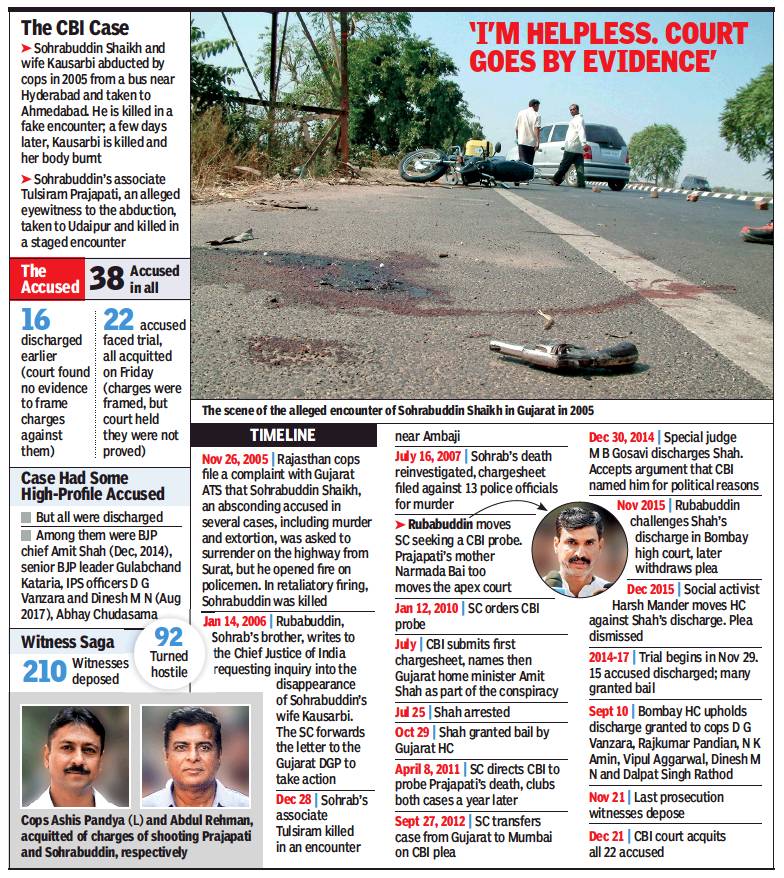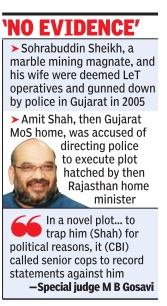Sohrabuddin encounter case
This is a collection of articles archived for the excellence of their content. |
Contents |
The progress of the case
2005-14

From: December 31, 2014: The Times of India
See graphic:
The Sohrabuddin encounter case- timeline, 2005-14
2005-18

From: Rebecca Samervel, Sohrab death homicidal, couldn’t be proved: Judge, December 22. 2018: The Times of India
See graphic:
The Sohrabuddin encounter case- timeline, 2005-18
2014: CBI court drops case against Amit Shah

From: Swati Deshpande, CBI court drops Sohrabuddin case against Amit Shah, December 31, 2014: The Times of India
In a major victory for BJP president Amit Shah, a special CBI court held that there was no legal evidence against him in the Sohrabuddin Sheikh fake encounter case of 2005 and discharged him as an accused.
“There is substance in the contention of Shah's counsel S V Raju that the charges against him were politically framed,“ said special judge M B Gosavi in a courtroom packed with media, relatives and wellwishers of Sheikh, an alleged gangster who had managed to get a stranglehold on marble mining in several areas of Rajasthan.
“There is no prosecutable material against Shah which requires a trial,“ the judge added. Nearly five years ago, when the Supreme Court ordered a CBI inquiry into the Sohrabuddin fake encounter case dissatisfied with the Gujarat police’s probe, there was no inkling of the agency spreading its dragnet so far as to catch the state’s then junior home minister Amitbhai Shah.
Seven months after the January 12, 2010 order of the SC transferring the probe to the central agency, the CBI filed a chargesheet. The accusation against Shah was that he was the lynchpin of the conspiracy to eliminate Sohrabuddin. On July 25, 2010, Shah was arrested and sent to judicial custody.
After three months in jail, Shah got bail from Gujarat high court on October 29, 2010. The CBI rushed to the Supreme Court to challenge it. But the SC confirmed the bail on October 30, 2010 after Shah gave an undertaking that he would not enter Gujarat till further orders.
Shah, who had to resign from the then Gujarat council of ministers headed by Narendra Modi, was in for more trouble when the CBI convinced the SC that the Tulsiram Prajapati fake en counter incident formed a part of the larger conspiracy in the Sohrabuddin encounter case and it, too, ought to be probed by the agency. On April 8, 2011, the SC handed over the Tulsiram case to the CBI.
The CBI registered a separate FIR on April 29, 2011, and filed a chargesheet in the Tulsiram Prajapati case on September 4, 2012, citing Shah and a number of senior police officers of Gujarat as accused. Shah challenged the registration of a separate FIR and filing of a new chargesheet in the Tulsiram case before the SC.
When Shah’s petition was pending, an SC bench of Justices Aftab Alam and Ranjana P Desai on September 27, 2012, transferred the Sohrabuddin trial from Gujarat to Mumbai.
Shah’s petition challenging the chargesheet in the Tulsiram case was decided by a bench of Justices P Sathasivam and B S Chauhan on April 8, 2013 and the judgment proved to be the turning point for Shah — both legally and politically.
The bench accepted Shah’s plea and said the CBI, which had taken the stand that the Tulsiram case was intrinsically part and parcel of the Sohrabuddin fake encounter case, could not have filed a separate FIR followed by a chargesheet.
This judgment gave ammunition to BJP to accuse the UPA government of indulging in foul play and misusing the CBI to wreak political vengeance against Modi. BJP accused the CBI of overzealousness to go after Shah to please ‘political masters’ in the UPA government.
Now, it is to be seen whether the CBI files an appeal against the trial court order or attempts to please the present ‘political masters’.
I had hoped for justice: Tulsiram's mom
The special CBI court's decision to discharge Amit Shah from the fake encounter case of Sohrabuddin and Tulsiram Prajapati has added to the despair of Prajapati's mother Narmada Bai, a resident of Ujjain. “My hope for justice has been dashed. Many people tried to influence me but I was waiting for justice,“ Narmada Bai told reporters. Prajapati, a noted criminal, was killed on December 28, 2006. Later, in 2011, the Supreme Court directed CBI to investigate the murder. In 2012, the CBI in its chargesheet named Amit Shah as an accused in the case.
One by one, 92 witnesses turned hostile, sank case
One of the biggest blows to the prosecution’s case was the unprecedented number of witnesses who resiled from alleged statements given to the CBI and turned hostile in court. Of the 210 witnesses, 92 — many crucial to establishing the prosecution’s theories of the abduction of Sohrabuddin Shaikh, his wife Kausarbi and his associate Tulsiram Prajapati from a bus near Hyderabad and even Tulsiram’s presence on that bus — turned hostile.
On April 18, 2018, the 50th witness, a passenger on the bus who was touted to be an eyewitness to the abduction, was declared hostile. During her deposition, the witness denied telling the CBI that on the midnight of November 22, 2005, while she was on a bus from Hyderabad to Sangli, the vehicle was suddenly stopped and people identifying themselves as cops took two men and a burqa-clad woman with them. The woman told the court that she was sleeping during the journey. She also denied that in addition to her parents-in-law, her husband was also travelling with her. The woman’s husband and father-in-law had deposed in court earlier and they too were declared hostile. Her motherin-law had died before the trial began on November 29, 2017.
Although not declared hostile, a brother of Sohrabuddin who deposed on September 17 too claimed that Prajapati was not with Sohrabuddin and his wife during their alleged abduction.
On January 31, a dhaba owner at Shahajpur on the Mumbai-Pune highway denied seeing Gujarat police with Prajapati at his eatery. The prosecution had said the dhaba owner in his statement given to the CBI in 2011 had said about five to six years earlier, cops had arrived at the dhaba in two vehicles, one of which had Prajapati. The prosecution statement further said that cops had told the witness that the accused in the vehicle was a criminal who was picked up from Hyderabad and had to be served food. Further, the statement allegedly said that cops had also asked him to be careful as there was a fear that the accused might flee.
However, the witness, while accepting that cops from various states used to frequent the dhaba, denied any such incident relating to Prajapati had taken place. He also denied that he had identified Prajapati's picture shown to him by the CBI in 2011.
CBI court’s verdict, 2018
‘Sohrab death homicidal, couldn’t be proved’
Will Appeal Against Ruling: Sohrab Brother
A special CBI court said that it was certain that Sohrabuddin’s death was homicidal as he had died of bullet injuries, but the court could not pin the blame on the accused for lack of “substantial evidence”.
“When I went through the evidence, whether these accused were the authors of this crime, whether they were answerable, whether the accused were at the spot, I have not found any substantial evidence,” said judge S J Sharma.
As soon as the judgment was pronounced at 12.10pm, all 22 accused, present in the crowded court room, heaved a collective sigh and scrambled to find a mobile signal to call family members while congratulating each other. They were all out on bail.
Earlier, 16 accused, including BJP chief Amit Shah, BJP leader Gulabchand Kataria, and IPS officers D G Vanzara, Abhay Chudasama, Geetha Johri, Dinesh M N and Rajkumar Pandian, were discharged (no charges were framed against them) in the case.
Sohrabuddin’s brother Rubabuddin, who has been fighting for justice since the encounters over a dozen years ago, was present in court and said he would appeal against the verdict. He added that there was no mention of his sister-in-law Kausarbi in the judge’s oral observations.
Tulsiram’s mother Naramadabai was stoic, and said her life had already been destroyed. “Faisla ho gaya hai. Ab aur koi taqleef nahi de yeh umeed karti hoon (The verdict has come and I hope now no one else will trouble me).”
CBI special public prosecutor B P Raju said the judgment copy was awaited and a future course of action would be decided by senior officials after perusing it. He denied comment on the verdict.
“Jo purava diya gaya hai woh samaadhan karak nahi hai (the evidence submitted in court has not been substantial),” said judge Sharma, adding, “I am helpless. The court always runs on evidence.” After going through the evidence and testimonies on record, he had come to the conclusion that neither the conspiracy nor the link between the 22 persons and the three deaths could be established.
The court added that the prosecution cannot be faulted if witnesses turn hostile. “Sarkar ne bahut mehnat ki, hostile hona sarkar ke haath mein nahi thi… Efforts pure they,” the judge said.
It was the prosecution’s case that on November 23, 2005, Sohrabuddin, Kausarbi and Prajapati were abducted by cops from a bus near Hyderabad. The couple was taken to Ahmedabad, where Sohrab was killed in a fake encounter. A few days later, Kausarbi was killed and her body burnt and disposed of in a river bed near Illol village in Gujarat. Prajapati, an alleged eyewitness, was shown as arrested and later taken to Udaipur. On December 28, 2006, he too was allegedly killed in a staged encounter.
Crucially, the court said it could not be proved that Prajapati was the third person travelling with Sohrab and his wife when they were abducted. It added that the defence claims that Prajapati escaped from police custody on a train while he was being taken for a court hearing and was killed in an encounter is substantiated.
The CBI had alleged that discharged IPS officer D G Vanzara had told Gujarat cop Ashish Pandya to be part of Prajapati’s alleged encounter and had cancelled his leave. “The CBI failed to produce any substantial evidence, phone records, etc to prove that Vanzara called Pandya for this specific purpose,” the court added.